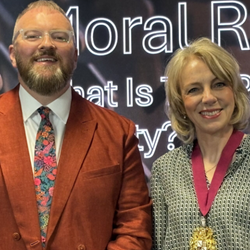
Professor Steven Vaughan with Sarah de Gay, Master Solicitor of the City of London Solicitors’ Company
Lawyers and law firms should be “actively” reflecting on and talking about integrity “much more” than they currently do or appear to do, a leading legal academic has argued.
Professor Steven Vaughan also said it was “perfectly acceptable” that the Solicitors Regulation Authority (SRA) code said “so little” about integrity, although the guidance “probably could say a little more than it currently does”.
Professor Vaughan, based at the UCL Faculty of Laws, said that when moral challenges “do or might arise in legal practice”, solicitors should “take the time to reflect on them (in the moment and in advance); to sense check our actions; to engage in moral deliberation; to sit with the uncomfortable idea that we are doing harm and creating significant negative impacts, even if there are good reasons for so doing.
“This is about accepting the moral responsibility for the actions we take as lawyers.
“Are you – a solicitor or a law firm – sure you are acting for the ‘right’ reasons, and can you thoughtfully articulate what those reasons are? Are you as a solicitor being supported by your firm to engage in this form of moral deliberation?”
Delivering The Master’s Lecture at the City of London Solicitors Company, Moral remainders: What is the price of professional integrity?, Professor Vaughan said that despite being labelled by others as a “very unhelpful concept”, the obligation on solicitors to act with integrity did “two important things”.
He explained: “First, it acts or might act as a catch-all where a solicitor’s conduct is problematic but where we are unable to find a particular rule to attach that problematic conduct to. This is how it is a ‘useful short-hand’.
“Second, the professional principle of integrity is a powerful reminder and signifier – like the professional principle of independence, like the principle on the rule of law – of the special role of the solicitor: a reminder that simply doing what a client wants is not the be all and end all.
“Integrity, more than the SRA’s other principles, captures the ‘spirit’ of the professional role, quite apart from the individual substantive rules. The challenge of articulating that spirit remains, of course.”
In line with the SRA’s approach to continuing competence, Professor Vaughan said lawyers and law firms needed to be “actively reflecting on and talking about integrity; much more than I feel they currently do or appear to”.
He said what would be required, and when, would differ depending on the situation, as set out by the SRA guidance on acting with integrity.
“It is here where that integrity-linked need and obligation to reflect that I have talked about is so critical.
“The entire regulatory scheme of the Legal Services Act and the SRA code/rules is that lawyers have a complex of duties, which may sometimes be in tension, and moments of discretion.
“Integrity – like the professional principle on independence, like the professional principle on the rule of law – simply suggests to lawyers what should guide their conduct when exercising that discretion: that they are institutional actors in our justice system with important social roles.”
Professor Vaughan said that, over time, he had come to the view that one of the biggest problems with professional ethics was that solicitors “often outsource our professionalism and forget our agency”.
He has suggested in his research that some lawyers in large law firms saw the firm’s compliance officer for legal practice (COLP) as “holder of the firm’s moral compass and the keeper of its moral code, leading to forms of ‘COLPing mechanisms’ in professional ethics, i.e. a feeling of ‘Someone else in the firm is doing ethics for me’”.
Having described ‘moral remainders’ as “defensible actions with moral costs”, the City solicitor turned academic said one of the invitations that went out for his speech referred instead to ‘moral reminders’.
“While this was a typo, it gets to the heart of what I am talking about. Integrity as a signifier, as a reminder.”
He added: “I have suggested this evening that I think it perfectly acceptable that the SRA code says so little about integrity, although its guidance probably could say a little more than it currently does…
“Seen in this way, the legal obligation on solicitors to act ‘with integrity’ is primarily a signalling device to lawyers of their special social and institutional roles and, importantly, that the SRA code of conduct is not the be-all and end-all of how to be a ‘good’ lawyer.
“Integrity as a principle in the code is then, above all else, an important moral reminder.”












Leave a Comment